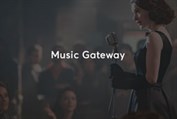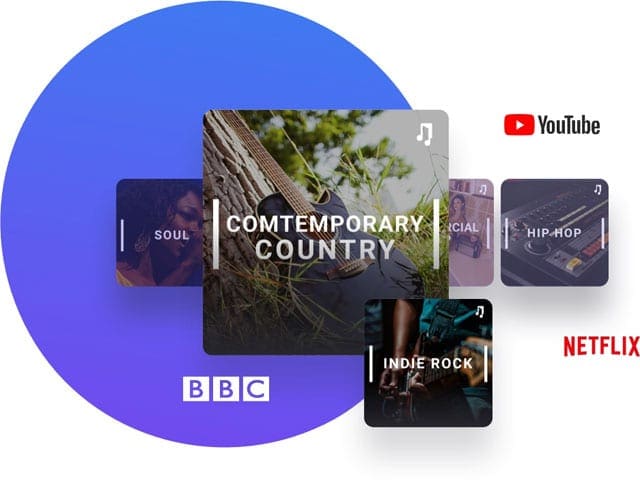Musician: Everything you need to know about life as a freelance musician
They say when you do something you love for work, you never work a day in your life. A musician can seem like a dream job for many, but it’s not always the glamorous life you’d expect. When you’ve made it, sure, but it’ll take hard work, flexibility and a lot of practice to get there.
Musicians/vocalists can have one of the most varied working days in the music industry; one day it might be playing jazz at a club in front of a live audience, next it might be working on a rock album in a studio for a recording artist. Your clients can be worlds apart; some days you might simply be playing what you’re told to and the next being asked to improvise and contribute to an arrangement. Versatility is key in this role.
There’s no way to sugar coat it, being a freelance musician is hard. If you’re not prepared for sleepless nights, long working hours and the stress of “where’s my next paycheck coming from?” then maybe this line of work isn’t for you. We’re here to give aspiring musician’s information about the trade and prepare you for what your work life might look like as a freelance musician.
Education
Higher education isn’t essential to making it as a musician or professional singer, but it can be advantageous. It all depends on your skillset and what progress you want to make. Training, theoretical knowledge and musical talent are the basic requirements for a career as a musician. If you’ve been playing the guitar since you were five maybe you don’t need to go to university. That’s your choice to make for yourself.
On the other hand, it could be an amazing opportunity to learn about the industry from professors who have had their careers, learn and work with a new generation of musicians and broaden your skillset. Your fellow students could open up doors for you further down the line and your school may have links to the industry that could help start your professional musician career.
Like any decision concerning education, you have to evaluate which is the right path for you. If you don’t think you need to spend the time or money on education, then don’t. If however, you think the extra training, broader industry insight and mentorship could help you, then start looking for courses. There are music degrees available at universities all over the world. Choose a programme that will help you develop your skills in the areas where you want to advance.
For singers, again higher education isn’t necessary but can help. The one thing recommended everywhere for singers, however, is professional vocal coaching. Your voice is your instrument and you have to take care of it. Especially if you start getting more gigs and you’re singing five times a week, you need to know how to maintain it and not encourage illness. If you can’t sing, you won’t be able to work and then your income is gone.
If you want to make it, you have to commit!
There’s no other way around it. If you want a successful career in music, you have to really throw the whole kitchen sink at it, you can’t do it part-time. Just the same as if you were starting any other small business. Trying to balance a full-time job and starting your own music business, (because that’s what being a freelance musician is), just isn’t going to be sustainable.
Eventually, you’ll burn out. You need to be able to wake up in the morning and do something with the day that will benefit your future musical career. Of course, giving up your day job to focus on music comes with a huge list of problems before you even face the struggles of being self-employed. How are you going to pay the bills, rent, buy food and all of that other day to day things you need if you don’t have a job or income from music?
If you’re going to go for it, it’s worth setting yourself up before you commit. Save some money as an initial investment for your musical career that will help you pay the bills and live for a couple of months while you’re trying to establish yourself. It’s definitely going to take longer than a few months before you’ve got regular, well-paying work, but you need to think about your self-responsibilities before considering the musician responsibilities.
If you’re taking your musical career seriously and are looking for enough work to sustain you, you’ll also need to be in a music centre. There isn’t going to be enough work, money or industry to go around if you’re still living in the little town you grew up in. There’s a reason everyone moves to London and LA, it’s where the work is.
Before you take the plunge, ask yourself if your skill level is where it needs to be. Of course, you can always learn more, but don’t spend the first month you move to London learning how to instantly read sheet music whilst spending your preciously saved cash.
Planning
If you don’t have a plan, you’ll wake up every morning thinking: “now what?”. You have to manage your time effectively and be proactive. Every week you don’t achieve anything is another week out of your investment budget.
Plan what you want to achieve by the end of the first week. Setting small goals is the key to success. Get yourself into a daily routine and make your work time as productive as possible. A pen and paper is good and focuses the mind, striking through a task is a tiny sense of achievement and every little once of success is motivation to the next.
If you want to be a theatre musician, you’re going to have to read music like it’s a second language. If you can’t, make that your goal. Set yourself a target that by the end of the week, you’ll be able to name all the notes on the stave. Breaking down bigger tasks into small chunks will make those long term goals much more achievable in a shorter space of time.
The more skills you can learn as a musician, the more desirable your services will be. Learn how to read sheet music and it’ll open up theatre jobs, develop your improvisational skills and you could be asked to help produce an album with an artist. Knowledge of different musical genres can open up your client base.
The more music jobs you do, the more people you’ll meet in different circles. Make a good impression and they can recommend you for jobs. The more instruments you can learn will also improve your employability and could allow you to charge more for your services.
Getting advice and support from fellow musicians can be highly benefical. There’s a number of places to find them including music platforms like Music Gateway. If you are part of a big band or looking to find band members, these are all considerations.
Stay Positive!
Like we said, being a freelance musician is hard. It’s so easy to fall into a negative frame of mind, especially when the end goal seems so far away. It’s hard looking for work, making contacts and worrying about a lack of gigs, all while trying to figure out how to pay next months rent. Sometimes these thoughts can’t be helped but what matters is how you react to them.
Feeling like you’re moving in the right direction can make a huge impact on your positivity. Achieving your weekly goals can go a long way in making you feel like you’re progressing.
Sometimes all you need is to take a step back to gain some perspective and take your mind off it. It’s so easy to sit in your flat and work all day every day; but taking an afternoon off to see family, friends or to do something non-musical can really help you stay fresh and positive. It’s rare to find any great musicians who haven’t found it tough progressing their career.
Network
This is possibly the biggest piece of advice we can give you. Every successful musician will tell you the same. You’re not going to be booked for live performances or gigs if no one knows you exist or you’re a complete misery to be around.
Just get out there. Make yourself known. Go to the shows in your town, there are plenty in music centres. Go to all the networking events, hang out with people after the show, meet up for coffee; just do anything you possibly can to meet and make like-minded friends.
Think about a tradesman, this is a bit old school, but their network events are the pub after work, its where sweary blokes go to share stories and get leads about what new work is around the corner. The same applies around most sectors, from jazz music sessions, punk rock gig is to hip hop open mic nights. Most pop music artists have launch nights, where you will find press journalists, artist management, booking agents and music industry pros, so those tickets are a hot target to add to your list.
In today’s music industry, it’s all about who you know and who you are friends with. It’s rare for someone to be booked purely because they’re an incredible player. People want to work with their friends. Friends book friends. The more friends you have, the more likely you’ll be booked. Think about it, would you rather spend six months on a small tour bus with an amazing drummer that has a terrible attitude or an ok drummer that becomes your best friend?
Be more than just a musician.
There’s no typical musician’s job description anymore. It’s no longer good enough to just play the guitar really well. Versatility and flexibility are now some of the strongest traits of successful musicians. The more skills you have, the more employable you are.
Make friends with music producers and learn to do what they do. You never know, you could end up playing for an artist that wants to record some demos but doesn’t have the knowledge or contacts to do so. If you know how you can do it and get paid to do so. The artist gets their demos, you get paid and more than likely, asked to keep working with them.
music producers and learn to do what they do. You never know, you could end up playing for an artist that wants to record some demos but doesn’t have the knowledge or contacts to do so. If you know how you can do it and get paid to do so. The artist gets their demos, you get paid and more than likely, asked to keep working with them.
Learn to write songs, sing backing vocals, arrange strings and horns. Learn to build websites and use PA systems. You never know, all of these extra skills could make the difference between you and that other guy, especially if you sing backing vocals.
If you’re a singer think about dancing, could that open more doors for you? You might want to consider performing arts classes as well. You never know what you may be asked of you for a job and it could improve your stage presence and confidence.
Have great equipment that works – be prepared for everything.
If you want to work as both a live and studio musician, make sure you have the right kit for both. It looks sloppy and unprofessional if you turn up for a job without everything you need. It tells people you’re unprepared, but also wastes time and annoys people. Don’t count on someone else having a guitar cable or the other drummer having sticks you can use. If someone has gone to the effort to book a musician, think about their expectations, meet them and ideally go that extra mile.
Make sure all of your equipment works. There’s nothing worse than turning up to a recording studio session and your guitar isn’t intonated properly or playing a show and your amp dies mid-set. Be prepared.
If you’re a guitarist, have a great sounding Strat, Les Paul, acoustic and any other possible guitar sound there is. Have that classic Marshal amp for rock shows or that clean Fender tone. Having great equipment that can cover every possible scenario is vital to a successful carrier as a freelance musician.
Advancement
So how do you advance your career? Well, if heed all the advice we’ve given, like making good contacts and keeping them, constantly learning and working well, then you’ll organically begin to build a network and more professional musician jobs will come your way. Once you’ve got some good experience and your clients become more high profile, you can start charging more for your services.
The wider your skillset you can also charge more for your services. If you can save a producer hiring three people because you can play those three instruments, then they can pay you a higher rate. It may be that your career naturally takes off in one direction, like studio sessions or live shows. The higher you climb the more you can direct your career in the direction you want it to go.
Employment and running your business
So as we’ve said you’ll most likely be self-employed. The roles and responsibilities of a musician don’t stop at playing music; you will also be working as a manager, marketer, accountant and admin. All these duties will fall to you and you must be able to juggle each element of your business.
There is a myriad of elements to think about here and it’s good practice to set them all up when you start your career. Make yourself a website where people can find your services, listen to your music and contact you. Use social media to promote your business and help generate interest. Register yourself as self-employed and get some accounting software to manage your invoices, cash flow and accounts. Take out insurance for your instruments to protect against damage and theft, as well as errors and omissions insurance to protect against unhappy clients.
Keep yourself organised and the whole process will become easier. If you get this stuff right at the start, it won’t become any more complex later on, the only differences will be bigger paychecks and busier schedules.
As a freelance musician, you could find yourself working with different players across the music industry, from other musicians to producers and music supervisors. Depending on your skillset and the natural progression of your career, it’s likely you’ll work with venue booking agents, studio managers and even top recording artists.
You’ll need to perfect interacting with a mix of people, each at different stages in their career. It’s important to be professional, make a good impression and go that extra mile. Be confident and level-headed, don’t get star struck but of course compliment someone if you admire their work.
There are also legal elements involved in making and performing music that you should be aware of as a freelancer. If you’re ever doing studio sessions with producers and a recording artist who’s making demos or finished tracks to be published, you may be entitled to writing credits.
If you’re asked to contribute to an arrangement and a section of music you wrote ends up being used in the finished track, then you can lay claim to a portion of the composition rights of that track. This means that each time the song is purchased, streamed, played on the radio etc you should receive a portion of the royalties. Make sure you understand copyright law if you’re ever involved in writing music. Negotiate your share of the composition rights there and then to avoid later conflict and establish how you’ll be compensated for your work.
Earnings
It’s hard to give a figure here. Some music jobs you’ll be paid more than others, simply because the employer and the nature of the work varies. When you’re starting out some jobs may only cover your travel expenses, it’s up to you to decide if that’s enough and if it’ll be worth your while to do the show anyway. Of course, no one should work without pay but that’s the reality of starting your career. You have to start somewhere.
If you’re not sure how much to charge, use some of your contacts and ask their advice. The Musician’s Union can give you an idea of fair instrumental musician salary expectations and you can always go online to see what other people at your level are charging. As your career progresses you can, of course, charge more. Your fee should be proportionate to the prestige of the client and appropriate for the nature of the work. Ultimately you’ll be paid for what your talent, skill and services are deserving of.
Unions and associations
Like with any other line of work or profession, there are a number of trade unions, performing rights associations and professional groups you can join to help support your career. The Musicians’ Union, who we’ve already mentioned, are a trade union for musicians in the United Kingdom, helping to protect your rights, offer advice and lobby government for changes in policy to aid musicians’ careers.
As a freelancer, it’s important to protect your business and not let anyone take advantage of you. The MU are especially passionate about a musicians right to pay for their playing, as well as discrimination and bullying in the workplace. If you ever have an incident with another professional and need legal advice or community support than a trade union can give you that.
You also have access to a vast community through unions and associations which can open up music jobs for you. The MU and other organisations like them host a number of networking events throughout the year to help promote communication and work for musicians. Your access to opportunities increases drastically through membership to a union. There is power in numbers, a union could save you in a moment of need.
If you’re in the UK, there’s also performing rights organisations (PROs) such as the Phonographic Performance Limited, (PPL), and the Performing Rights Society who collect performance royalties for their artists. If you’re in the States or Canada, then the American Federation for Musicians can help protect your rights and support you in your career.
Summary
There may be elements here that sound very doom and gloom. However, being a freelance musician can be an incredible job. Each day can be different; you could be playing for thousands of people one day and playing to an empty room the next. Associates for any given day can be just as varied as a musicians’ work environment. You could also have a crazy busy month of non-stop sessions and then nothing for three weeks. It’s all part of the excitement and can bring balance to your career.
You’ll likely make mistakes, as does everyone. Play shows where you ask “Is this really worth it?” and then play ones that make you never want to do anything else! Be prepared for working crazy hours of the day and picking yourself up when things don’t seem to work out.
You’ll have days where you feel like you’re not getting anywhere, so does every other musician. You’ll feel like you’re not good enough and feel like getting a ‘normal’ job is much easier, but if you’re truly passionate about your music it’ll all be worth it in the end.
It’s a competitive industry but with the right advice, motivation and skill, you can achieve a living and much more. Sign up to Music Gateway and check out our Global Creative Marketplace to see if any projects could be looking for someone like you.
FAQ Section
Q: What percentage of musicians make it?
About 1% of artists and musicians, earn all the large revenue in the music industry. They make up a huge 80% + of all social media likes, followers and YouTube subscriptions. There is a small % behind the mainstream artists that earn a good living from music and the large % struggle to earn a living.
Q: What qualifications do I need to be a musician?
Most musicians start learning from a young age, maybe from a parent or private teacher or at school. But for higher education, we explore what type of training and qualifications do you need?
- BTEC Level 2 Diploma in Performing Arts. Entry with two GCSEs (A-D)
- BTEC Level 3 Diploma in Performing Arts. Entry with four GCSEs (A-C)
- HND Courses in Performing Arts or Popular Music
- Degree Courses in Performing Arts or Popular Music
- Foundation Degrees
Q: What artist has the most #1 hits?
Here is a list of artists with the highest number of top numbers 1 singles of all time
- Mariah Carey 27
- Janet Jackson 27
- Elton John 27
- Stevie Wonder 28
- Michael Jackson 29
- Rihanna 31
- The Beatles 34
- Madonna 38
Q: Who is the most successful band of all time?
So, who are the best selling artists of all time?
- Elton John 78 million
- Michael Jackson 81 million
- Billy Joel 82.5 million
- Eagles 101 million
- Led Zeppelin 111.5 million
- Elvis Presley 136 million
- The Beatles 178 million
Q: How many hours do musicians work?
It is estimated that the length of daily practice for musicians will range from 1 hour to 8 hours per day and surveys claim that there is little benefit from practising more than 4 hours per day. A typical recording session is 4 hours but can be much longer depending on the requirements.
Q: What is the demand for musicians?
It is reported that employment for musicians and singers is forecast to grow 6 per cent between 2016 to 2026, which is on par (average) with growth for other occupations. This growth will be due to increases in demand for musical performances on the whole, rather than recording session work.
Q: What is the salary of a musician?
The average musicians’ average yearly salary in the United States is reportedly $42,000. Musicians salaries will typically start from $10,000 and go upwards of $100,000 per year.
Q: What are the working conditions for a musician?
Musician and singer working schedules will depend on the performance, especially if performing for the public in a live venue. Rehearsals and recording sessions are commonly held during normal business hours starting at 9 am until 6 pm, however, evening sessions can be common, if the session player is balancing multiple work priorities.
Live performances are most often at night and on weekends. Until fully established, many musicians and singers find work part-time and may experience long periods between jobs.
Q: What are the responsibilities of a musician?
Session musicians, singers and performers will typically be responsible for the following
- To perform music to live audiences and within recording studios, called session work.
- To audition to be hired for an orchestra, choruses, bands, and other types of musical groups
- To practice their instruments and or to perfect their singing and improve their technique and skill
- To rehearse and prepare for upcoming performances
Q: Is being a musician a career?
Yes, being a professional musician is a career in music. Here is the definition of a musician career. Musicians, including members of bands and orchestras, perform and record music for live or recording sessions across multiple music genres and can include classical music, jazz, or contemporary music and popular chart music.
























